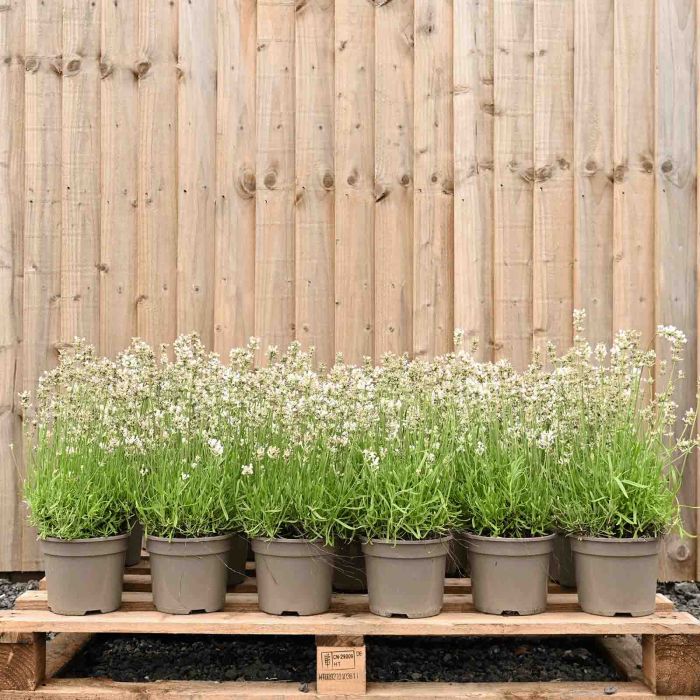
White Lavender 10/20cm 2L pot x 50 Lavendula Arctic Snow
In stock


Other White Lavender plants
Key Features
EVERGREEN
AVERAGE GROWING
HAS FLOWERS (White)
Is Grazing Animal Friendly
Seasonal Availablity
- JAN
- FEB
- MAR
- APR
- MAY
- JUN
- JUL
- AUG
- SEP
- OCT
- NOV
- DEC
White Lavender 'Arctic Snow' Hedge Plants Description
This pure white flowering Lavender (sometimes called 'Lavender Snow' or 'Arctic Snow Lavender') makes a gorgeous contrast against the darker backgrounds of other lavender varieties and has an attractive compact mound of grey-green, aromatic foliage. It is an English variety of Lavender that is well suited to our climate (other than wet soils) and hardy in all but the coldest winters. Deadhead spent flowers in the growing season and prune after the last flowering in late August to keep the plant dense and bushy once established. See our pruning advice tab for more information.
White Lavender (or Pale Lavender) is a popular variety of Lavender hedging, but we do also have the following additional varieties - English Lavender, Lavender 'Hidcote', French Lavender, and Dwarf Lavender. See our total selection of flowering hedging and fragrant hedge plants.
These plants are available all year round. Plants bought in autumn, winter or spring will flower in the first summer.
We are happy to do a discounted pallet deal of mixed Lavenders - please phone to specify how you'd like them to be mixed.
Additionally we now stock a series of specially selected Lavender Collections within our Garden plants range featuring several English and French Lavender varieties plus a special mixed variety pack.
Is White Lavender Evergreen?
All lavender varieties are technically classed as evergreen, as in warmer climates they retain their grey-green foliage year round. However, the cooler UK climate means Lavender starts to lose its flowers in August and plants go into dormancy from early autumn until late spring. During dormancy the foliage turns brown and twiggy, appearing to die back. This is perfectly normal and as the weather warms in late spring, your Lavender plant will once again become green with new shoots.
Vital Plant Information
Reviews
Plant Guarantee
Hedges Direct always supplies quality plants, however we know that sometimes plants have a mind of their own. With the Hedges Direct Green Guarantee, we've got you covered. Our 12-month guarantee is our 100% promise to you, that you can buy with complete confidence, that if any plants fail within 12 months, we will replace them when the guarantee conditions are met.
-
Step 1
Root Grow & Fertiliser
Ensure you buy root grow and fretiliser with your plants at the time of purchase
-
Step 2
Prepare Your Planting Area
Make sure your planting area is in good condition and suitable for planting
-
Step 3
Plant & Feed
Plant with root grow & the second feed. Support plants if necessary. Water regularly
You May Need
Pruning Advice
Lavender is very easy to cultivate but the key to its longevity is pruning. Aside from regular deadheading through the growing season to encourage flower production, a harder prune back should be done as soon as the flowers start to fade in August. We recommend removing at least one third of the plant, not just the flower spikes. This allows light to penetrate into the heart of the plant after which small shoots will then grow a further 5cm before the plants start to go dormant in September.
Pruning in this way ensures that your White Lavender plants have a lush, tidy appearance through winter. Once spring comes, the new shoots wil re-commence their growth giving you a dense shrub and healthy production of flowers as the weather warms.
Alternatively, you can leave the spent flower heads on the plants until spring because in winter, when food for birds is scarce, birds will come to feed on the seeds - goldfinches in particular! Plants might eventually become wooded and straggly so it is best to replace a hedge after about 20 years though this is not always necessary.
Lavender and Dormancy
It's important to note that when Lavender goes into dormancy from early autumn until late spring, it will become brown and twiggy .This is perfectly normal and it will become green again in the spring. Read our Hedges Direct Lavender Guide for more advice and information.
 Hedges Direct
Hedges Direct 










